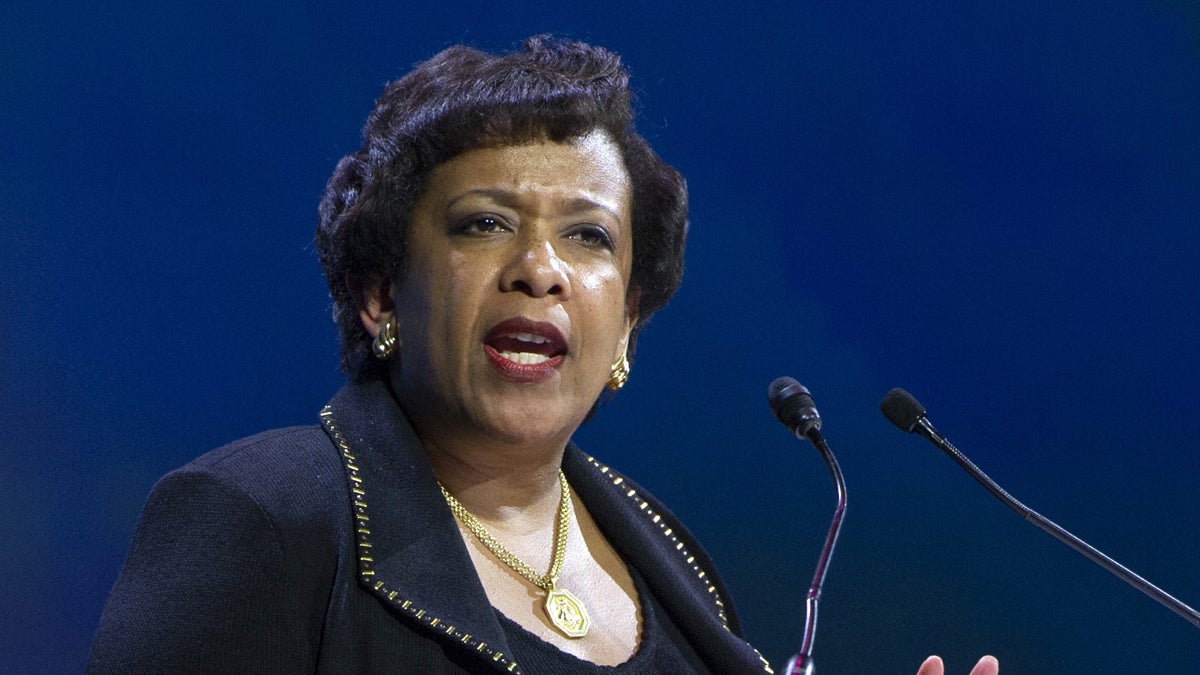The tarmac, revisited: Loretta Lynch’s ‘painful’ regrets

Attorney General Loretta Lynch us shown addressing the White House Summit on the United State of Women in Washington on Tuesday
Good grief, Bill Clinton is gabbing again. He riffed yesterday about Hillary’s loss: “We had the Russians and the FBI, and she couldn’t prevail against that.”
Actually, she lost for lots of reasons — and Bill, most definitely, was one of them.
We all knew, at the start of the ’16 campaign, that he’d say or do something dumb — and, sure enough, he did the latter in the worst way. On June 27, he crossed an Arizona airport tarmac to seek an impromptu meeting with Attorney General Loretta Lynch, whose plane was idling there. His timing could not have been worse. The FBI was finishing its criminal probe of Hillary’s private email server, and Lynch would soon be tasked with making the final call on whether to prosecute. It was clear, as I wrote of Bill shortly after the tarmac incident, that he doesn’t grasp “the concept of impropriety.”
Bill can talk all he wants today about the Russians and James Comey’s letter (and, yes, they were factors), but the tarmac incident was surely a factor too, because it fed the Trump narrative that the system was “rigged.”
We should never forget that the Clintons have long been gifted at screwing things up — and making life difficult for people in their orbit. Loretta Lynch is a classic case. She wanted to accomodate Bill on that tarmac; after all, back when he was president in 1999, he’d made her a U.S. attorney. But now she vocally regrets her “social” meeting with Bill. On CNN two days ago, she said so repeatedly during a lengthy exchange with Jake Tapper. Here it is, minus the extraneous chatter.
Tapper: “He saw your plane on the tarmac. He got on board your plane. How did that visit happen? Did somebody say, ‘Hey, President Clinton is outside, he wants to come in,’ or did he just come in?”
Lynch: “It was communicated to me that he wanted to say hello.”
Tapper: “Looking back, do you wish that, when he came over, you said, ‘We really shouldn’t talk, it would really be inappropriate, and hello and goodbye’?” Lynch: “Days after that meeting, I regretted not seeing that issue and not seeing around that corner.”
Tapper: “It didn’t cross your mind when you were sitting there, like, ‘Oh, somebody is going to make a big deal out of this’?” Lynch: “Our conversation went on a lot longer certainly than I had anticipated, because it was just going to be ‘hello, how are you’.”
Tapper: “He’s a talker.”
Lynch: “He is a talker, yes, yes. He is a talker … I wish I had seen around that corner and not had that discussion with the former president, as innocuous as it was, because it did give people concern … My greatest concern has always been making sure that people understand that the Department of Justice works in a way that’s independent and looks at everybody equally. And when you do something that gives people a reason to think differently, that’s a problem. It was a problem for me. It was painful for me.”
Tapper: “Do you think that Director Comey’s press conference was also affected by this, the idea that he wanted to be as transparent as possible?”
(That was an important question, and we’ll likely never get the answer. But it’s reasonable to believe that Comey conducted his unprecedented July press conference, where he absolved Hillary of criminal intent but tagged her as extremely careless, because he felt the need to be extra-transparent, if only to dispel the suspicion that Bill and Lynch had cut some sort of deal in secret.)
Lynch, in response, seemed to agree about Comey: “I didn’t speak to the director about why he had his press conference before he did it. We learned of it right before [he did it]. He was trying to be as transparent as possible.”
Comey might not have gone public if Bill hadn’t forced that meeting with Lynch. Bottom line is, the tarmac meeting played beautifully into Trump’s hands, affording him fresh opportunities to stoke public distrust of the Clintons. And Comey was emboldened to essentially sideline Lynch as the final arbiter of the email probe, with public remarks and letters that dampened Democratic enthusiasm.
Today, Bill doesn’t understand that he too was a factor in the race. He can’t seem to connect the dots. He showed up at a small-town bookstore the other day, and he was still talking to whoever would listen about Hillary’s loss — mock-praising Trump’s ability “to get angry white men to vote for him,” and insisting that “James Comey cost her the election.”
You know what, Bill? Shut up already.
—
Follow me on Twitter, @dickpolman1, and on Facebook.
WHYY is your source for fact-based, in-depth journalism and information. As a nonprofit organization, we rely on financial support from readers like you. Please give today.

